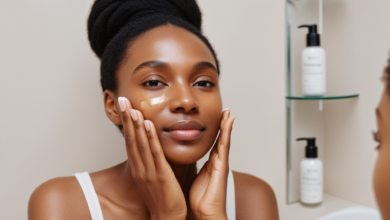How to Keep Your Skin Hydrated All Day Long: Expert Tips for Glowing Skin

Proper skin hydration is essential for maintaining a healthy, glowing complexion. Dehydrated skin can lead to dullness, fine lines, and an overall tired appearance, making it crucial to keep your skin well-moisturized throughout the day. In this article, we’ll explore the best ways to keep your skin hydrated all day long, ensuring your skin stays radiant and supple no matter the season or environmental conditions.
Why Is Skin Hydration Important?
Before diving into the tips, it’s essential to understand why skin hydration is so important. Our skin acts as a barrier that protects the body from harmful elements, and keeping it hydrated helps maintain its elasticity, smoothness, and overall health. When the skin is dehydrated, it can become dry, flaky, and more prone to irritation or damage. Proper hydration not only improves your skin’s appearance but also enhances its function as a protective shield.
Top Tips to Keep Your Skin Hydrated All Day Long
1. Start Your Day with a Hydrating Cleanser
The first step to maintaining hydrated skin is using a gentle, hydrating cleanser. Many cleansers can strip your skin of its natural oils, leaving it feeling tight and dry. Choose a cleanser that contains moisturizing ingredients like glycerin, hyaluronic acid, or ceramides to ensure your skin stays soft and hydrated even after washing.
- Expert Tip: Avoid using hot water when cleansing, as it can dry out your skin. Use lukewarm water instead for a gentle, hydrating cleanse.
2. Use a Hyaluronic Acid Serum
Hyaluronic acid is a powerhouse ingredient for hydration. This natural humectant can hold up to 1,000 times its weight in water, making it a key player in keeping your skin moisturized throughout the day. After cleansing, apply a hyaluronic acid serum to your damp skin to lock in moisture and keep your skin plump and hydrated.
- Pro Tip: Look for serums with multiple molecular weights of hyaluronic acid to ensure it penetrates different layers of the skin.
3. Choose a Moisturizer with Hydrating Ingredients
The right moisturizer is critical for keeping your skin hydrated all day long. Opt for a moisturizer that contains ingredients like hyaluronic acid, glycerin, aloe vera, and ceramides. These ingredients help to trap moisture in the skin and strengthen the skin barrier.
- Best Practice: Apply your moisturizer while your skin is still slightly damp to lock in as much moisture as possible.
4. Drink Plenty of Water Throughout the Day
Hydrating your skin from the inside out is just as important as topical hydration. Drinking enough water throughout the day helps maintain your skin’s moisture levels and keeps it looking fresh and plump. Aim for at least 8 glasses of water a day, and more if you’re in a hot or dry environment.
FAQ: How much water should I drink for hydrated skin?
While the general recommendation is 8 glasses a day, you may need more based on your activity level, climate, and skin needs.
5. Use a Hydrating Mist for Mid-Day Boosts
If your skin starts to feel dry during the day, a hydrating facial mist can be a lifesaver. These mists are packed with hydrating ingredients like rose water, aloe vera, or hyaluronic acid and can refresh your skin with just a few spritzes. Keep one in your bag or at your desk for an instant moisture boost when needed.
6. Apply Sunscreen Every Morning
Sunscreen may not seem like a hydrating product, but it’s essential for keeping your skin healthy and preventing moisture loss. UV rays can dry out your skin and cause long-term damage, leading to premature aging and dehydration. Choose a sunscreen with moisturizing ingredients and an SPF of at least 30 to protect your skin from sun damage.
- Quick Tip: Opt for a sunscreen that contains hydrating ingredients like glycerin or hyaluronic acid for added moisture.
7. Avoid Harsh Ingredients
Certain skincare ingredients can strip your skin of moisture, leaving it feeling tight and dry. Avoid using products that contain alcohol, sulfates, or artificial fragrances, as these can disrupt your skin’s natural moisture barrier. Instead, choose products with gentle, hydrating formulas.
- Warning: Be cautious with exfoliants and astringents, as they can over-dry your skin if used too frequently.
8. Eat Hydrating Foods
In addition to drinking water, you can also hydrate your skin by consuming water-rich foods. Foods like cucumbers, watermelon, oranges, and leafy greens have high water content and can help boost your skin’s hydration from the inside out.
- Best Foods for Hydration: Cucumber, celery, watermelon, strawberries, and oranges are some of the best hydrating foods you can incorporate into your diet.
9. Use a Humidifier in Dry Environments
If you live in a dry climate or spend a lot of time in air-conditioned spaces, a humidifier can make a big difference in keeping your skin hydrated. Dry air can sap moisture from your skin, leaving it feeling parched. Using a humidifier in your home or office helps add moisture back into the air, which can prevent your skin from drying out.
FAQ: How often should I use a humidifier for hydrated skin?
It’s best to use a humidifier whenever the air feels dry, especially during winter months or in air-conditioned environments.
10. Apply an Overnight Hydrating Mask
An overnight mask can be a game-changer for keeping your skin hydrated while you sleep. These masks are packed with nourishing ingredients that work to restore moisture while you rest, so you wake up with soft, hydrated skin. Look for masks that contain hyaluronic acid, glycerin, or aloe vera for deep hydration.
- Pro Tip: Use an overnight mask 1-2 times a week for an extra hydration boost.
11. Seal in Moisture with Oils
Facial oils are excellent for sealing in moisture and preventing water loss. After applying your moisturizer, layer a few drops of facial oil over your skin to lock in hydration. Oils like jojoba, argan, or rosehip are great options as they mimic your skin’s natural oils and help to maintain a healthy barrier.
FAQ: Can oily skin types use facial oils?
Yes! Oily skin can benefit from facial oils as they help balance your skin’s natural oil production. Just be sure to choose lightweight, non-comedogenic oils.
Common Mistakes to Avoid
1. Skipping Moisturizer After Cleansing
Many people skip moisturizer in the morning, thinking it will make their skin oily or cause breakouts. However, skipping moisturizer can leave your skin dehydrated and unprotected from environmental stressors. Always apply a hydrating moisturizer after cleansing to lock in moisture.
2. Not Reapplying Sunscreen
Even if you apply sunscreen in the morning, you should reapply it every 2-3 hours, especially if you’re spending time outdoors. UV rays can break down your skin’s moisture barrier, so regular reapplication is key to keeping your skin hydrated and protected.
3. Using Hot Water
While a hot shower might feel relaxing, hot water can strip your skin of essential oils, leading to dehydration. Opt for lukewarm water when washing your face and body to maintain your skin’s moisture balance.
Conclusion: Achieving All-Day Hydration for Glowing Skin
Keeping your skin hydrated all day long doesn’t have to be complicated. With the right skincare routine and a few lifestyle adjustments, you can achieve soft, glowing skin no matter your skin type. Start with a hydrating cleanser, use a serum packed with hyaluronic acid, moisturize, and protect your skin from the elements with sunscreen. Incorporate hydrating mists and eat water-rich foods to stay moisturized from the inside out. By following these simple steps, you’ll ensure your skin stays hydrated, healthy, and radiant all day long.





